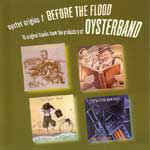 A quick Google search tells me that the average lifespan of a pearl-farmed oyster is six years, while the lifespan of a freshwater oyster can be as long as 80. The individual ages of the Oysters — members of our own, darling Oysterband — lie someplace between the two, while the Oysterband as a whole marked its 25th anniversary several years ago.
A quick Google search tells me that the average lifespan of a pearl-farmed oyster is six years, while the lifespan of a freshwater oyster can be as long as 80. The individual ages of the Oysters — members of our own, darling Oysterband — lie someplace between the two, while the Oysterband as a whole marked its 25th anniversary several years ago.
If you’ve followed the Oysterband for only the past 20 years, Before the Flood will surprise. (“Only the past 20 years” — how many bands with a fairly stable lineup can you say that about?) Before the Flood pulls 16 songs from four comparatively ancient albums: Jack’s Alive from 1980; English Rock & Roll: The Early Years from 1982; Lie Back & Think of England from 1983; and Liberty Hall from 1985. (All four albums were reviewed by Ed Dale for GMR in The Oysterband — The Very Early Years . And I have to agree with his verdict: “These LPs prove that the Oysters were always good, but have nevertheless gotten much better.”) This album focuses mostly on traditional ballads and dance tunes. In the early ’80s, the group didn’t have a drummer, but John Jones, Alan Prosser, and Ian Telfer were there. This album also credits Chris Taylor and Ian Kearney.
If you look, there are plenty of clues here to the band’s evolution from playing country dance tunes and ballads to the 1990s-era noise and black leather, on their way towards making the magnificent Deserters and Holy Bandits. The choice of traditional songs hasn’t changed much over 25 years. “Prentice Boy” is a murder-and-retribution ballad, and “Breaking of Our Lord’s Birthday” is more a matter of divine retribution against a poor schmuck. “Stonecutter Boy” has an interesting arrangement (who thought a prominent jaw harp was a good idea?) and lovely voices. “Old Molly Oxford” is a classic, played slowly, and still much too short. On the other hand, the first part of the “Rufford Park/Bobbing Joe” medley goes on much too long. I was impressed, though, that even then the band could keep a steady beat and escape the apparently universal desire of musicians to speed up (much to the dismay of the dancers). The “Sheepstealer” of the song’s title is bold, hard, and wicked, while the unfaithful wife conspires with her fancyman at the “Dockyard Gate.” The band has kept “Lakes of Cool Flynn” in their repertoire for years, and “Gallop Hey” sounds familiar, too. Would that they still played “Michael Turner’s Waltz” and the spooky “Liberty Hall” as well.
The latter song is an early collaboration between John Jones and Ian Telfer, one of five original compositions on the album. The dark side of misrule and yearning towards freedom (and chaos) is evident here. “I’ll thow away the compass, jettison the chart, and when I call to Liberty Hall I’ll navigate by heart.” I adore this song.
The other original songs include Alan Prosser’s “A Longport Hymn,” a gorgeous instrumental that starts (not surprisingly) with Prosser’s guitar, then adding fiddle and other instruments. At just over two minutes, it’s too short. Prosser is still turning out beautiful instrumentals with fabulous guitarwork — that hasn’t changed at all. Telfer’s “Think of England” is bitter, but delivered too gentlely to be scathing — it is also one of the very few songs on the album with a drummer (Claire Hewlett). Similarly, John Jones’ “Steal For Joy” presages any number of songs that celebrate the very human tendency towards lawlessness, and defies authoritarians who would quash those who partake. It’s somewhat mournful, too — the band hadn’t yet hit its stride, the way it would later with lyrics like: “you ask me why we celebrate when nothing has been won / we take dark hours, we make them great, that’s all we’ve ever done.”
“Six Grey Men” by Jones, Prosser, and Telfer is a very traditional sort of song: with call and response, additive verses, and the sort of simplified story-telling one finds in plague songs. The topic is the development of nuclear weapons. Also an excellent song. Why isn’t it well-known; why aren’t there multiple covers of this song? I don’t know.
One can think of this collection as either revisionist history or merciful editing — Jack’s Alive is represented by only “Lakes of Cool Flynn” and “Limbo,” giving more space to songs from the later albums. And, inevitably, some of my favorite songs from those albums aren’t here: Where is “Waiting on Glory” or “Euston Station” or “Arise, Arise” or “Drink Again”? (Although I admit, none of those are traditional and all but one is on Liberty Hall.)
Folkies who shy away from later Oysterband albums may find this a worthwhile album: the musicians are excellent, the arrangements are mature, many of the tunes are danceable, and you won’t need earplugs.
The mileage for Oysterband fans may vary. Even collectors who have the original vinyl albums can enjoy owning the songs on CD. If you haven’t heard anything earlier than Step Outside this album will surprise you. For me, it’s a pleasure. I’ve enjoyed the band’s evolution over the years, but I like where they started from, too.


